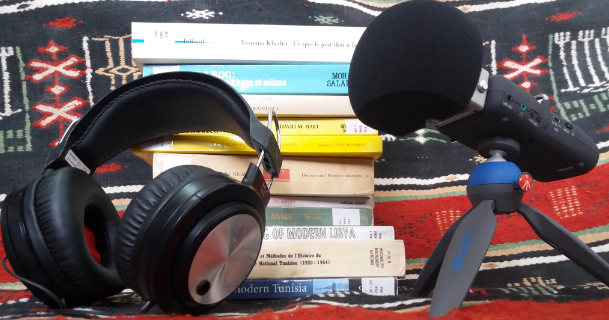
65.4K
Downloads
228
Episodes
Maghrib in Past & Present | Podcasts is a forum in which artists, writers, and scholars from North Africa, the United States, and beyond can present their ongoing and innovative research on and in the Maghrib. The podcasts are based on lectures, live performances, book talks, and interviews across the region. Aiming to project the scientific and cultural dynamism of research in and on North Africa into the classroom, we too hope to reach a wider audience across the globe.
Maghrib in Past & Present | Podcasts is a forum in which artists, writers, and scholars from North Africa, the United States, and beyond can present their ongoing and innovative research on and in the Maghrib. The podcasts are based on lectures, live performances, book talks, and interviews across the region. Aiming to project the scientific and cultural dynamism of research in and on North Africa into the classroom, we too hope to reach a wider audience across the globe.
Episodes

Thursday Jun 13, 2019
William Wordsworth and te French Revolution
Thursday Jun 13, 2019
Thursday Jun 13, 2019
Episode 67: William Wordsworth and te French Revolution
Dr. Mounir Khélifa studied English at the Sorbonne and Yale University where he received his MA and PhD, respectively. A professor of English language and literature for more than three decades, he taught poetics, comparative literature, and literary theory at the University of Tunis. Former director of the graduate program in English, Dr. Khélifa was also a senior advisor to the Ministry of Higher Education and Scientific Research, where he was responsible for international cooperation and curriculum reform. Currently, Dr. Khélifa runs the School for International Training study-abroad program in Tunisia. He is a lifetime member of the Tunisian Academy for the Arts, Letters, and Sciences, Beit al-Hikma.
William Wordsworth was the only English poet of his generation to have been an eyewitness to the French Revolution. To the momentous event he devoted no less than three books in his autobiographical epic poem, The Prelude.
It is conventionally accepted that his relation to the revolution altered radically during the course of the events, and that this relation went from passionate enthusiasm at the storming of the Bastille to doubt and fear during the Reign of Terror to utter rejection and denial at the rise of Napoleon and during the ensuing Napoleonic Wars.
Yet even as this doxa accounts for the poet’s changing attitude towards the revolution, it fails to explain the complex emotional and intellectual processes that activated the change. It fails mainly to consider that the change occurs in a poem designed to ratify “the growth of the poetic mind.” Wordsworth has no pretense to be a historian. His recounting of the revolutionary events, he warns the reader, is justified only insofar as the events have been “storm or sunshine to [his] mind.”
Dr Mounir Khélifa argues that if the expression “storm and sunshine” refers to the aesthetic emotion known as the sublime (beauty that has terror in it, Edmund Burke), then this emotion never abated in him and that throughout his entire life he kept “daring sympathies with power” whenever he recalled the French Revolution.
This lecture was co-organised by the Centre d'Études Maghrébines en Algérie (CEMA) and the École Normale Superieure d’Oran (ENS).
This episode is part of the Arts & Literature in the Maghrib lecture series and was recorded on April 24th, 2019, at the École Normale Supérieure d’Oran (ENS).
Pr. Sidi Mohamed Lakhdar Barka, Professor of Comparative Literature from the Department of English at University of Oran 2 moderated the lecture.
We thank Dr. Jonathan Glasser, Cultural Anthropologist at the College of William & Mary for his istikhbar in sika on viola for the introduction and conclusion of this podcast.
Realization and editing: Hayet Lansari, Librarian, Outreach Coordinator, Content Curator (CEMA).

No comments yet. Be the first to say something!